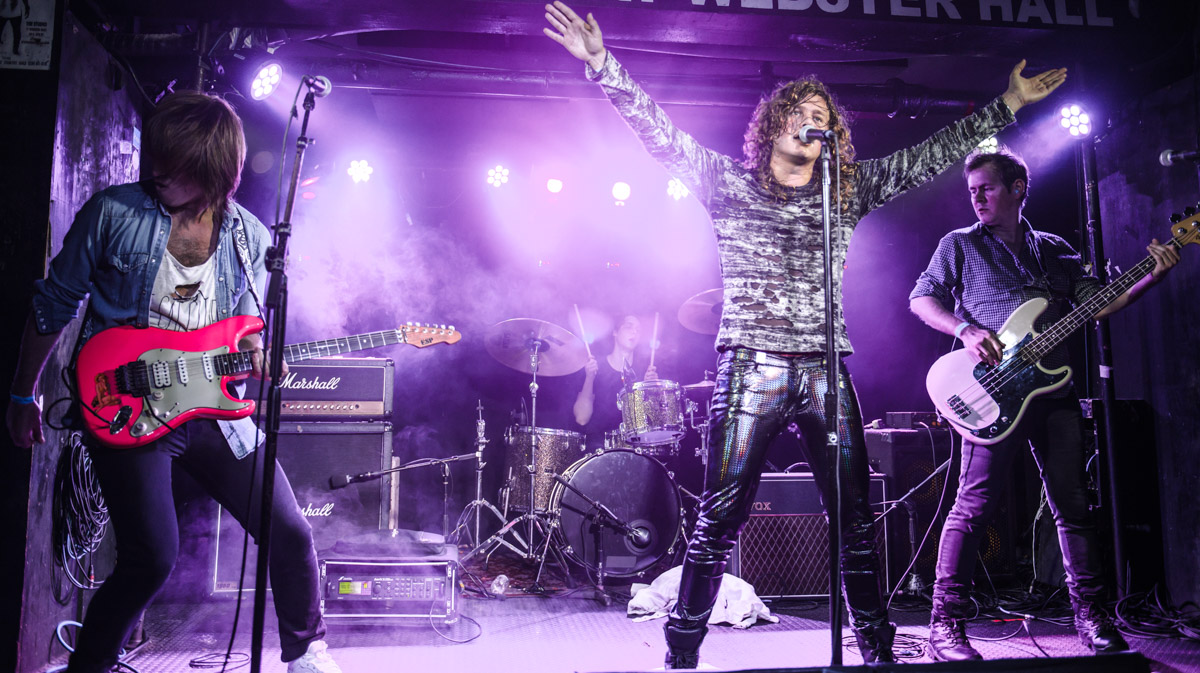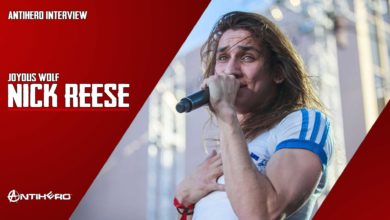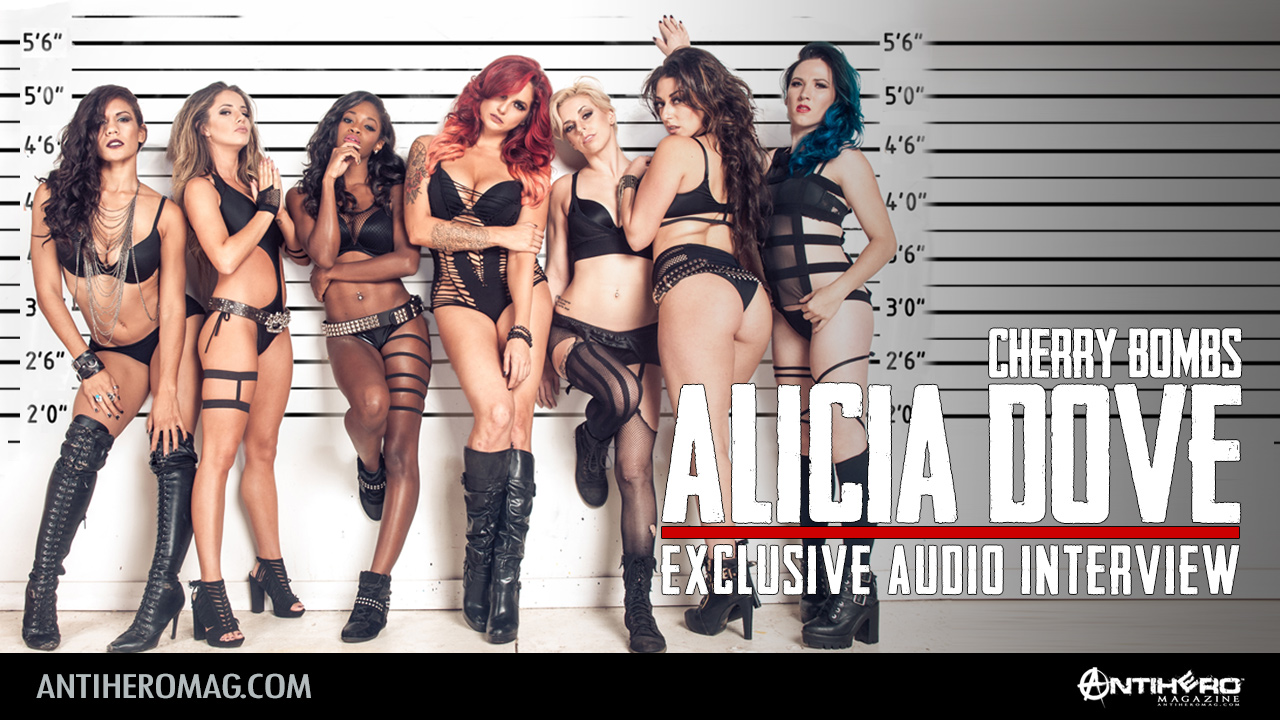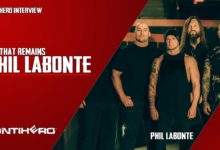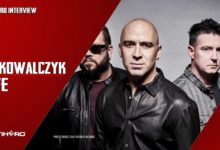Interview with vocalist Zach Allen and guitarist Harrison Marcello from TEMPT
Interview by Mark Dean
Formed in New York City, with an astonishingly young yet accomplished line-up, Tempt set out their stall in magnificent fashion and deliver the goods, as their full-length debut album Runaway shows.
Tempt take compelling contemporary rock as their touchstone and foundation, but also keep one foot confidently in the past, drawing on the feel good classic rock of the 80s, lending their music an undeniably retro feel. This combination of new and old gives Tempt a sound and swagger that combines the cut and thrust of modern rock (like Rival Sons and Foofighters) with the blazing pride and passion of vintage arena rock (think Van Halen and Def Leppard); a staggering achievement in this day and age. [separator style=”line” /]
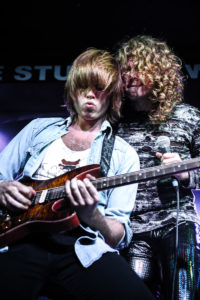
I first heard of you two years ago when my colleague at a former website saw you in New York supporting Tom Keifer. What have you been doing since then?
Harrison: I really spent a lot of my time finishing school. I just graduated from The Boston Conservatory with a bachelor’s degree in classical composition.
Zach: I was at The Frost School of Music at University of Miami. The school thing really had kept us from going full tilt with the band as we would be doing lots of shows during the summer and then be limited to only being able to perform during our breaks.
Harrison: The up side is that we were able to concentrate on more writing.
Zach: We were also able to really solidify the lineup of the band with Nick and Max joining the band. It has just elevated our live show so much now that we have two other musicians that are at our level and as dedicated as we are.
Harrison: It was a big reason for us waiting to release the record as well. We think our work here is good and we wanted to be able to promote it properly.
Can each of you tell me what your first impression was of the other? How has that changed?
Zach: It was apparent that Harrison was a really talented guy and it became apparent very quickly that we loved a lot of the same music. We really clicked. We’ve developed a real partnership.
Harrison: We got along immediately and were able to fall into a creative collaboration easily. Zach is an easy going guy and so am I so we’ve never had any drama or ego stuff get in our way of focusing on writing songs.
Zach: It was funny when we met because we had so many mutual friends and only lived a few blocks from each other.
What was your individual first introduction to music? Maybe a song on the radio, a first gig attended or maybe a parent’s record collection?
Harrison: I think it really started early for me. My parents are both musicians and so I was exposed to all types of music from an early age. They raised us on The Beatles and Motown and rock. My first rock concert was Rush when I was about 5. I can remember hearing “Round and Round” for the first time and being blown away. A really important experience was discovering Hysteria and really taking it in as an album, as a body of work. A collection of songs that were all great and that worked together. It’s such a benchmark for songwriting and production. Of course this was also the start of my study of Mutt Lange.
Zach: I have a very vivid memory of walking into Tower Records here in NYC and finding Slippery When Wet. I took it home and just listened through to the whole album a number of times checking out the liner notes. It was the album that I first delved into the other people that make a great record happen from Desmond Child to Bob Rock and Bruce Fairbairn.
Harrison: That’s something you do not get when you just purchase digital. What studio did they use? Who was the engineer and producer? It creates a different connection when you find an album that is clearly a complete body of work as opposed to a couple of singles and you start to delve into how it was made.
Zach: I guess we still consider music a really immersive experience. When I listen to a record I’m consumed by the music. Of course we also try and always listen on CDs instead of MP3s. The sound difference is real.
Harrison: Yeah we’ve had some wow reactions from friends when we pull the earbuds out give them some good headphones or speakers and crank up a WAV file. It’s a huge difference.
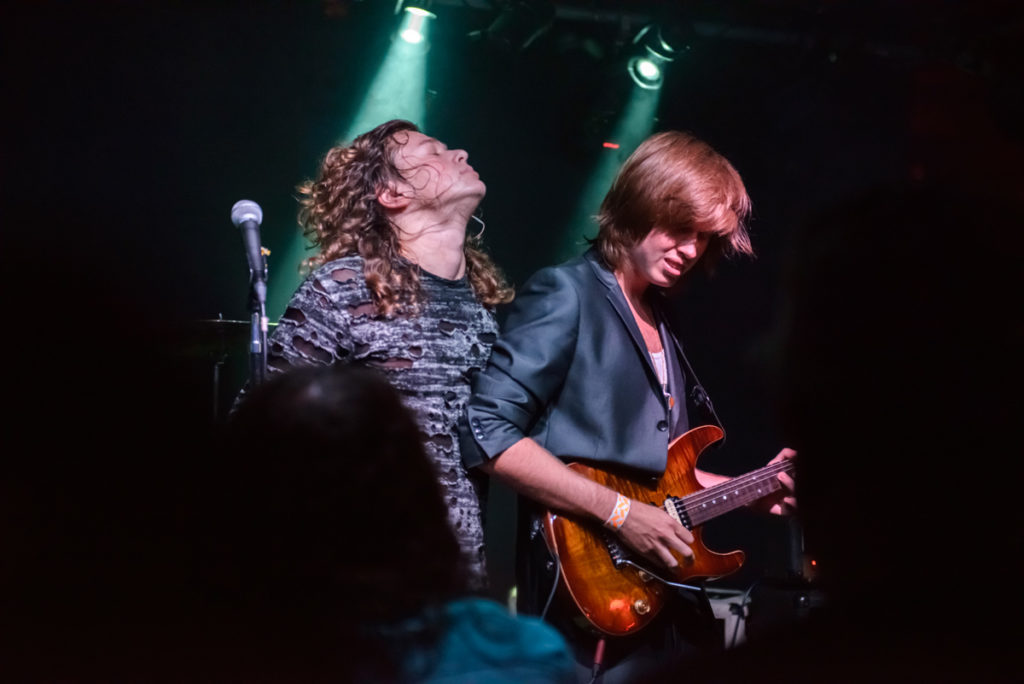
Can you each pick two songs (preferably different) from the album and discuss the recording process? How the song was devised/written? The story behind the song so to speak.
Harrison: “Aamina” and “Sapphire” are somewhat connected. A lot of what we write about is from our own personal experiences and life in NYC. Here in the USA the drinking age is 21. This is such a pain in the ass. We literally would do shows where most of our friends could not get in. So here we need to get fake IDs but also make relationships with club owners and doormen. There was a great Sunday night rock and roll party at a strip club we used to go to and Sapphire is about that experience. “Aamina” was one of the dancers there. So that one club gave us inspiration for two songs!
Zach: Yes, a lot of the songs are based on observations and experience of 19 year olds in New York. “Comin’ On To You” is about that flirtation that you can often have sort of the I know that you know that I know…. What happens when you’re making eye contact? Wait did she just look at me? Sometimes a song is just about challenging convention in a simple way. “Time Won’t Heal” is like that. Everyone always says give it time, it will get better. Well sometimes it doesn’t.
Harrison: We recorded this album in a total of about 3 weeks spaced out over some time. The mixes took about a day per song.
Zach: Our inspiration from a song can really come from anywhere.
Harrison: Sometimes it starts with a lyric and sometimes it starts with a cool riff. We really don’t have a set method.
An album contains a lot of songs. As individuals do you have a very strong work ethic? Were these the total of many years of writing songs and saving them or where they all devised after you entered the recording studio?
Zach: Harrison and I wrote this first album in about 4 months. In addition to the songs that made the record there were some additional songs that did not make it and some fragments of song ideas that never made it past an initial germination.
Harrison: One of the positives that technology has brought to the process is the ability to really produce full-fledged demos of songs at no cost. My home studio where we write is really a mini version of a recording studio where we are able to flesh out the song’s structure and the arrangements and to experiment with parts without the pressure of a budget. It allows us to realize the songs, get a good idea of what works and what doesn’t and to make changes including re-writing. There were actually a couple of guitar parts and vocal lines that we recorded in my home studio that are on the record. The drawback of the home studio is that we can’t all play together so I end up programming drums and playing all the guitar, bass and keyboards. So in the end we need to go to the real studio to play together as a band. Nothing can replace that interaction with other musicians. Even though I will have arranged bass and drums on the demos, we look to our band mates to use that as a jumping off point and to elevate it with their talent. That’s the fun and the magic of the process.
Zach: We both have a very strong work ethic and we are always working. We write new music constantly and of course that includes demoing the songs. This also helps us when we enter the studio. We are prepared and we know what we are going to do. The fact that everyone can be rehearsed and lock in quickly means that we then have time to experiment with different parts and ideas. We cut the 14 basic tracks for this record in two days.
Harrison: Well they were long days!
How much of a role did the producer have on your own tunes? Do they have much creative input in this day and age? Or do the band retain a great deal of artistic control?
Harrison: Our producers were very experienced and what they explained to us from day one was that it was their job to help us realize OUR creative vision. They suggested and facilitated bringing in people to augment the team such as Michael Wagener or Mario McNulty. The main message that they communicated to us through the writing and production was to stay true to ourselves and not to worry about what else was going on in the music business or on the radio or to worry about what a hit was.
Zach: Exactly, they encouraged us to develop our own voice. It’s hard when you’re in the bubble of the band to have any idea whether your material is good or not. We recorded the record before we ever performed any of the songs for an audience so we never got that feedback until later. We had confidence in what we were doing but doubt creeps in. They pushed that doubt out.
Harrison: They did send us back to do some re-writes on some of the songs that they felt were good but needed some tweaks to be better. But they always left it to us to do the work.
Zach: They never imposed on us from a writing perspective. They were of course very active in the studio in getting great performances out of all of us. Our goal was to have the record be recorded live with all of us playing together and capturing that vibe so having them in the control room objectively evaluating performances was key.
Harrison: We’re a rock band so this is a different situation than the 10 producers and 25 writers for a song that you see on so much of today’s music. That’s the factory approach with beat makers and top liners and who knows what. We’re a band.
Zach: Again I think that they viewed their role as helping us navigate the production process, bringing in additional talent and making our vision become real. For example, we had done all of the vocal arrangements for the record in Harrison’s studio. Tag suggested bringing in some different singers to sing with us to add some different flavor and texture to the background vocals. We tried it on “Comin’ On To You” first and it sounded insane so we did it on some of the other tracks.
Harrison: Definitely another example of interacting with other musicians and having it elevate the end result.
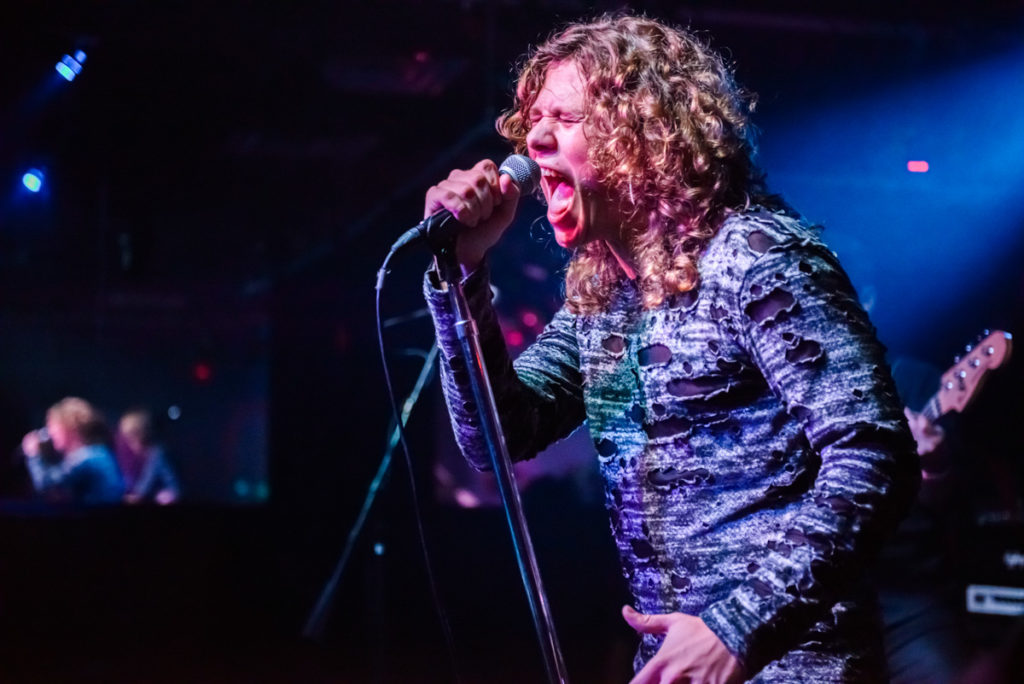
You are relatively young in age but have you already learned any valuable lessons? Has touring with legends such as Tom Keifer helped you; i.e., have they taken time to have a chat and offered you advice and guidance?
Zach: We have been fortunate to have many experienced and talented people on our team. For me, this project started with my working with Jack Ponti and it was Jack who said I needed a partner my own age to write with. A collaborator like The Glimmer Twins or Perry/Tyler, Page/Plant etc. He was also the one who found Harrison and put us together. He also taught me to write, write, write, write, write and then write some more.
Harrison: From the start we’ve had a great team in the studio and for our live shows. Tag and Billy made the entire recording process so much fun. We had Mike Hickey who is Joe Bonamasa’s guitar tech hanging with us in the studio and setting me up with amazing amps. Dave Snyder and his staff at Guilford Sound where we recorded were also amazing. Everyone was just always positive and helpful and with a good attitude. As a result, we treat everyone that we run into the same way. It’s a bit of the golden rule and it applies especially in the studio and venues where people are working hard so that you can succeed.
Zach: Always tip the house sound guy!
Harrison: LOL, Exactly. We try and learn everyone’s name and treat them right. It may be the only few hours that you ever spend with them but you’re all working for the same goal and we always want it to be a pleasant experience.
Zach: We’ve been lucky to have someone as experienced and actually legendary as Nite Bob mixing our FOH since we started and he has told us so many stories.
Harrison: And when he’s out on the road with Walter Becker and Steely Dan, we have Bob Held mixing us. They’re just really talented people but also good guys. Rock and Roll should be fun.
Zach: As far as people like Tom that we’ve played with. I think the biggest lesson that we learned from him is that every show is just maximum effort!
Harrison: Obviously, the entire economic structure of the music business has changed. At this point in our lives, we’re just out of school and dedicated to this. It doesn’t take a lot for us to live. We don’t need a lot and everything that we earn goes back into the band. At some point will we be able to make a living with the band? Be able to buy a house or put kids through school? I don’t know, but we’re going to give it a shot. When I’m not focused on the band, I’m writing commercials or producing other artists. So my income does come from music. Music has always been a very entrepreneurial field.
Zach: Right now from a financial perspective, we live in the moment. Is it ever going to be possible to live off music? We hope so. I think you have to be smarter than ever and cost effective in everything you do. Some of this question may be related to whether or not music can ever creep up to the same level of cultural importance it once had.
What is the current state of rock music in the States? Obviously, it’s a huge market to attempt to make a mark on-even before you set out to conquer the rest of the world?
Zach: I think rock music is still very strong in the US despite what you hear about Rock being dead. The fact is that a lot of the biggest festivals are rock music based and the most loyal and dedicated fans are rock music lovers. But we see Rock aging. It’s a lot of older bands. It is bands made up of members that are regrouping for the umpteenth time after being sidemen for larger acts or a couple of guys left from a once famous band. With the business constricting on many levels we don’t see the helping hand from established acts that we used to hear about and that many of them benefitted from because it often comes with a price tag that the agents or promoters put on it. Locally on the club scene, it is rare to find champions of new music. Music is also competing against a lot of other stuff. We also see a lot of the newer established bands that have reached a certain level are more aggressive, angrier, and less melodic.
Harrison: The time is really ripe for rock bands to really capture a younger audience again. Our peer group is sick of the pre-fab pop and they’re also burnt out on EDM. I mean how many times can you go see some guy push a button, put his hands in the air and wait for the confetti cannons and the drop? But they need bands that they can call their own, that speak to them, not their parent’s bands and not the bands that are made up of angry over-30-year-olds.
Zach: We’re not out to conquer the world, we want to build this organically and find people that want to go along for the ride with us. We’re actually going to really be concentrating in the UK and Europe initially and then coming home.
Harrison: I think our formula for success has to be similar to our recording process. Staying true to ourselves. We can’t worry what the US market is doing or what the world market is doing. The way we are going to connect is through the hard work of getting our record and our live show in front of as many people as possible and when we do, we think we will connect with them with the energy and genuine spirit that we have put into the music. We’re fortunate because we are surrounded by people that get it.
Outside music what are your spare time interests and hobbies?
Harrison: Zach and I play ice hockey together. I also ski and surf and really love exploring the world through scientific study such as astronomy. I also really enjoy philosophical and political discussion.
Zach: Love the beach, and as Harrison said, playing hockey.
Harrison: I’m a guitar player so of course I’m going to be influenced by the great rock guitarists so I gravitate to rock music of the 70s and 80s. But I also study classical guitar and listen to a lot of John Williams. I also listen to artists like Keith Urban, Vince Gill and Toby Keith and I also have an appreciation for Max Martin and an artist like Taylor Swift and her 1989 album.
Zach: As Miles said: “Good music is good no matter what kind of music it is.” We really listen to everything.
Touring is obviously where songs have life breathed into them when played to a live audience. So, what plans do you have to play, for example, in the UK where I am based? I do feel that there is definitely a market there for what you do.
Harrison: The album has just been released so we are in the process of planning a trip to the UK and Europe. That will be our first touring destination.
Zach: That’s where are label is based and that is where we are heading first. Hopefully we will see you in a couple months meaning Fall 2016. [separator style=”line” /]
[separator style=”line” /]

